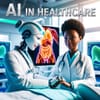Artificial Intelligence (AI) is transforming healthcare in unprecedented ways, from diagnosing diseases faster and more accurately to improving patient care and streamlining hospital operations. AI-powered systems can analyze vast amounts of medical data, including X-rays, MRIs, and CT scans, to detect early signs of conditions like cancer, strokes, and heart disease, sometimes even before human doctors notice them. For instance, AI algorithms can detect tumors and abnormalities in medical images with over 90% accuracy, and AI-driven research tools can uncover new uses for existing medications, accelerating innovation in treatments for conditions such as Alzheimer's, diabetes, and infectious diseases.
AI is also revolutionizing personalized medicine by creating bespoke health strategies based on individual genetic data and lifestyle. By analyzing large datasets, AI tools can predict how patients might respond to certain treatments and recommend the best possible options. This personalized approach is already improving outcomes in areas like oncology, where AI can help identify which cancer treatments are most effective for specific genetic profiles. Additionally, AI-powered chatbots and virtual assistants are making healthcare more accessible, providing instant medical information, scheduling appointments, and answering patient queries.
The impact of AI extends beyond efficiency and accuracy, as it can actually enhance the human aspect of medicine. AI can process vast datasets and identify subtle patterns, freeing up medical professionals to focus on complex patient interactions and emotional support. For example, AI-powered robotic surgical systems are improving precision and reducing surgical risks, while AI-driven hospitals are optimizing patient care with automation. Moreover, AI is accelerating drug discovery, reducing the time to develop new drugs from years to months, and predicting how drugs interact with diseases.
As AI continues to evolve, its potential in healthcare is vast, with exciting advancements on the horizon, including AI-powered nanobots for precision drug delivery, personalized health avatars, and quantum computing integration for complex biological simulations. However, challenges like data privacy, algorithmic bias, and regulatory frameworks must be addressed to ensure AI is used responsibly and safely. By embracing AI as a tool, medical professionals can deliver smarter, more compassionate care, making medicine more human, not less.


